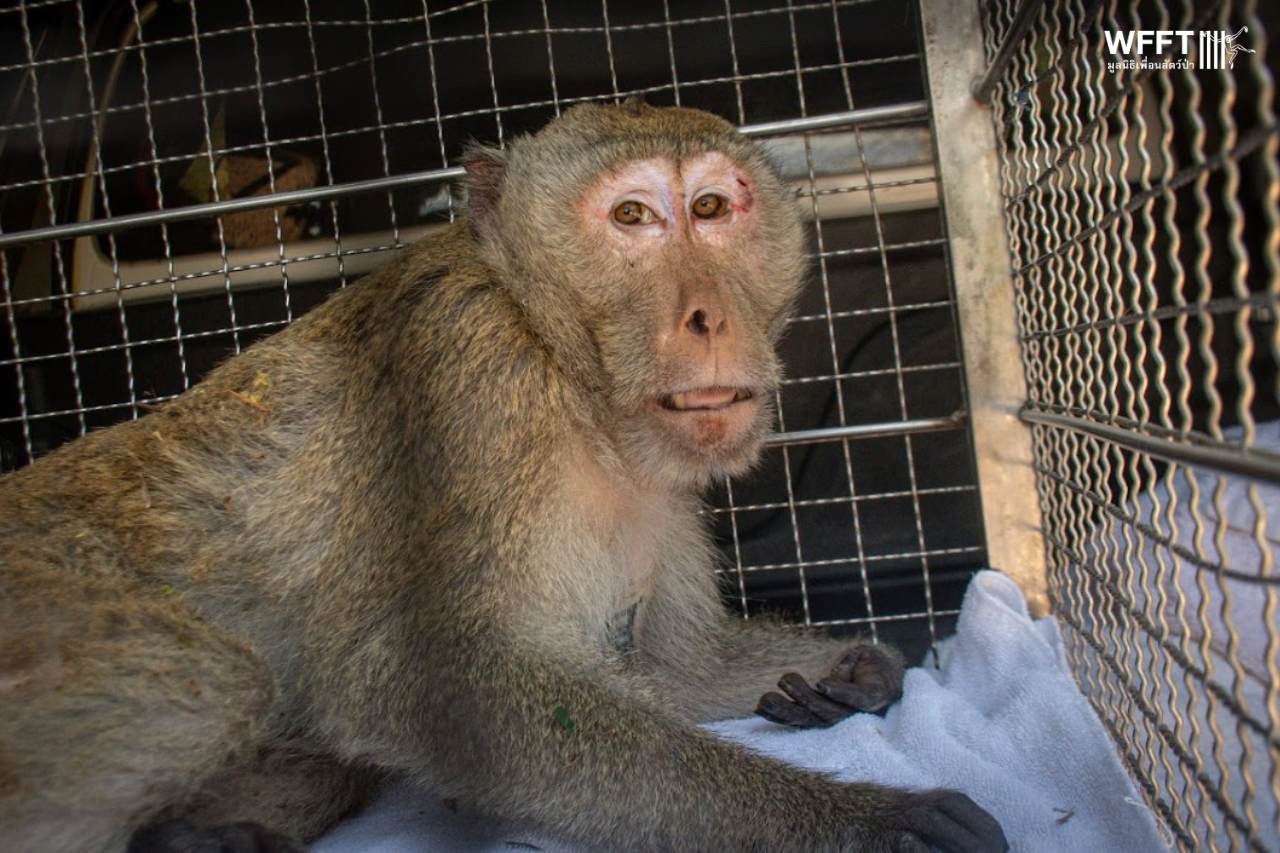It's time to take action—learn how you can help stop this exploitation and protect slow lorises from further harm.
Four New Primates in April
We’ve made it into May with a continuous intake of new primates into the rescue centre proving that far from slowing down; the problem of monkeys and gibbons being taken from the wild is still ongoing.
Nana, a black white-handed gibbon, arrived at the rescue centre at the beginning of April after being a pet for almost 20 years. When her owners didn’t want her anymore they dumped her at a temple and the monks bought her into the rescue centre where she is now living in a new enclosure in quarantine.
Just a few days later we got another phone call from a concerned citizen who had seen a baby gibbon for sale in Kanchanaburi. April, a blonde, 5 month old, white-handed gibbon was not for sale to become a pet, she was actually for sale to become bush-meat…someone was going to eat her! The couple who found her were unable to allow this to happen and bought her to prevent it. Although April certainly thanks them for saving her life, this unfortunately does not help stop the trade in gibbons…money has changed hands and the dealer doesn’t care why or how he has made that money. However, April is now very happy here and has a friend in Pang Pon who arrived at WFFT earlier in the year.
We thought that was it for the gibbons but no, one more was destined to arrive. Tengkwa, a 2-3 year old brown white-handed gibbon, had been kept in a tiny cage as a pet in Hua Hin. She came to WFFT’s attention 6 months ago due to a complaint from a neighbor who could see she was in a terrible condition. We established contact immediately and tried to encourage the owner to hand her over to WFFT but she was unwilling. However, our vet team treated the terrible skin condition Tengkwa had developed and continued to work with the owner to try and convince her that WFFT could offer her a better life. The owner didn’t agree so WFFT logged a complaint to the police and whilst waiting for Tengkwa to be confiscated, the owner was finally ordered to hand over the gibbon and as further treatment was found necessary she was handed over to the WFFT medical help. Tengkwa’s medical condition has improved enormously and after she has gone through her quarantine period, she can be introduced to other juvenile gibbons at the rescue centre.
The final arrival was not a gibbon but another arboreal primate. This time a dusky Langur or leaf-monkey, approximately 4-5 months old arrived. Samui, (named after the island he was rescued from), had been seen by a lady who felt sorry for him due to the tiny cage he was confined in. She wanted to help him so she bought him from the owner and contacted WFFT to see if we could provide him a better home. Our partners in Chumphon went to collect Samui and bought him back to the rescue centre where we discovered again that another primate had developed a bad skin complaint, probably due to stress and poor diet. He was started on a course of treatment immediately and just over a week later we can already see improvements in his condition. The likelihood is Samui was a photographers prop in Ko Samui before he was rescued, where tourists paid to have their picture taken with a cute baby monkey. Langurs are extremely sensitive and stress and poor diet can easily kill these vulnerable primates. Samui has survived so far and is now given round the clock care by the dedicated WFFT staff. He has an amazing spirit and hopefully this will help pull him through the next few months, ready for when he can meet the other rescued & abandoned Langurs that have found a home at WFFT.
WFFT were able to build a new enclosure in quarantine where Nana now lives via the Primates Appeal on Facebook. However, more primates need our help.
Please help if you can, by donating here … and forwarding this appeal to others.
If you prefer to donate via bank transfer, please write to us at info@wfft.org and we will provide you the details.




